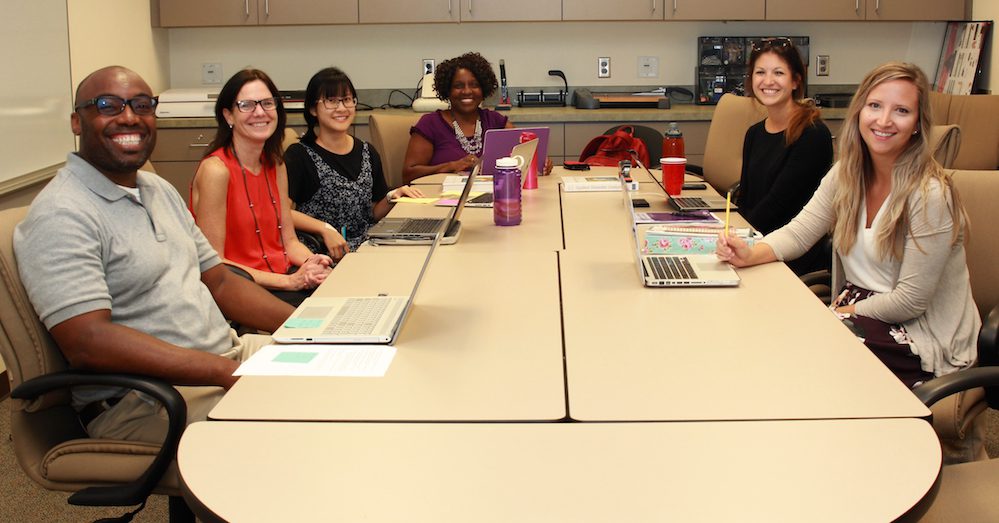About the Program
sSpecial Education Doctoral Degree Program
The doctoral program at UNC Charlotte prepares special educators as innovators, teachers, leaders, and researchers whose work contributes to enhancing the quality of life of individuals who are exceptional learners and their families. This program provides the solid research foundation needed for the rapidly changing field of special education. Alumni of the program are currently employed as special education faculty, research scientists, and special education administrators.

Doctoral Students in Special Education at UNC Charlotte
Researcher
The doctoral program at UNC Charlotte is a research-intensive degree program. All students are expected not only to learn to interpret research, but to generate new information through conducting studies and professional writing. Students take courses that include quantitative, qualitative, and single subject methodologies and have opportunities to work with faculty in conducting research studies. Students who anticipate a career as researchers will be able to take additional research coursework, work with faculty on ongoing research studies, and begin to develop their own research agenda.
Collaborator in Diverse Contexts
Enhancing quality of life for individuals who are exceptional learners and their families requires having the skills to create change. Change occurs when people have a new vision of what can be achieved and the resources to work towards that vision. Doctoral training at UNC Charlotte builds capacity among special educators to collaborate with professionals with diverse perspectives and plan culturally responsive teaching.
Teacher
The doctoral program at UNC Charlotte builds on the program’s strong tradition of training classroom teachers at the graduate and undergraduate levels. Doctoral students advance their skills for teaching students with exceptionalities by learning current research on instruction and its implications for practice. They also acquire knowledge and skills for teacher training at both the undergraduate and graduate level. Advanced teaching is developed through special seminars, opportunities to co-teach coursework in a specialty area, and through supervising student teachers.
Leader
Doctoral students at UNC Charlotte acquire skills that can be used in leadership in higher education, school districts, government, or community agencies. Leadership requires understanding policy and special education law and having skills in administration such as public speaking and leading a decision-making team. Leaders need skills to work with colleagues from diverse backgrounds and to ensure equal access to educational opportunities. Students can pursue additional leadership training through specially arranged internships or by taking coursework in educational administration.
The following are the program competencies: The UNC Charlotte Ph.D. student will be able to:
| 1. TEACH AT THE COLLEGE LEVEL |
|---|
| 1.1 Prepare teachers for licensure in high or low incidence, or early childhood |
| 1.2 Prepare teaches in use of coordinated services in natural environments to improve outcomes for infants/toddlers |
| 1.3 Prepare teachers to promote achievement in general education for all students with disabilities |
| 1.4 Prepare teachers to develop and address academic content standards |
| 1.5 Prepare teachers to use culturally responsive teaching |
| 1.6 Prepare teachers to identify and use evidence-based practices |
| 1.7 Prepare teachers to use principles of applied behavior analysis |
| 1.8 Prepare teachers to help students transition to adult living |
| 1.9 Develop, revise, and implement a personnel preparation program |
| 2. CONDUCT AND EVALUATE RESEARCH |
|---|
| 2.1 Summarize, synthesize, and evaluate studies that use a variety of research designs |
| 2.2 Plan and implement studies that meet standards from quality research |
| 2.3 Synthesize a collection of studies to determine if a study is evidence based |
| 3. COLLABORATE WITH DIVERSE PARTNERS AND FOR STUDENTS |
|---|
| 3.1 Collaborate with general education partners, including planning for needs of students who are CLD |
| 3.2 Demonstrate knowledge of literature on multicultural special education |
| 3.3 Apply knowledge of literature to personnel preparation |
| 4. PROVIDE LEADERSHIP IN SPECIAL EDUCATION |
|---|
| 4.1 Use leadership skills in a variety of contexts (e.g., college teaching, teaming with school partners, professional organizations) |
| 4.2 Describe key components of special education legislation (e.g., ESEA, NCLB, IDEA, highly qualified teachers, requirement for collaboration w/general educators) |
| 4.3 Plan and implement collaborations in special education through policy planning, advocacy, and professional development |
Contact Dr. Kristen Beach, Special Education Doctoral Program Director for additional information.
spcd-phd@charlotte.edu